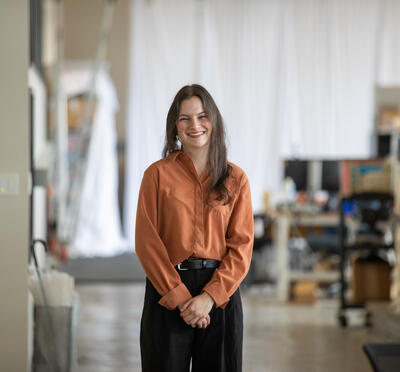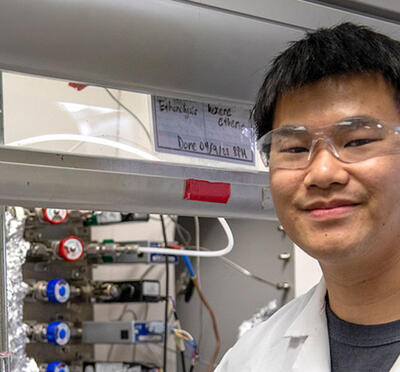Oregon State Engineers are creating a better future here and now, through vital research that tackles some of humanity’s greatest challenges. For the past two years, the Graduate Engineering Research Showcase has offered an exciting glimpse of that future, presented by some of the creative students who are helping to bring that future to life.
To help these master’s and Ph.D. students share the efforts of their hard work and brilliant insights, the College of Engineering brings in an expert for one-on-one and small-group coaching. Over a period of two months, Showcase presenters are trained in communicating complex, technical ideas to a general audience through accessible language, live demonstrations, and visual aids.
The student presenters walk away with increased confidence, mastery of a “soft” skill prized by industry and academia alike, and a polished talk that can help them land jobs after graduation.
Here’s a sample of what presenters over the past two years had to say about their experience.

Javier Corona
The graduate Showcase experience was truly one-of-a-kind. I was very nervous and anxious to participate, considering my general dislike of public speaking. However, from the beginning, I felt a sense of support and camaraderie. There were many uncomfortable moments (as is often the case when refining an insecure skill), but this sentiment helped me continue forward confidently. After the event, I felt the many hours of work and practice paid off, resulting in a renewed sense of excitement and community among my peers.

Ana Garcia Caraveo
Participating in the Showcase has transformed how I view myself as an academic and scientist. As graduate students, we often do not present our work to non-scientific audiences, focusing instead on the technical aspects of our research. However, it is crucial to communicate effectively with any audience, regardless of their expertise. Doing so makes science and academia accessible to everyone, can inspire future generations, and highlights our role in the development of new technologies. Additionally, I have gained much more confidence when presenting my results to my sponsors and colleagues. I find it easier to prepare slides for a presentation, remembering to tell a story, ensure the information flows, and emphasize key points.

Eric Slyman
The research Showcase was an excellent training opportunity that sparked a broader interest in my research. After the showcase, I was invited to give versions of the talk at the spring ’23 board of trustees meeting and at fundraising events like the ARCS Foundation Luncheon. These events, in turn, resulted in my work being featured in Taking Action, the Office of Institutional Diversity’s magazine, with an article on “Addressing Bias in AI” and as a featured part of the program in OID’s ’24 State of Diversity event. The skills we learned have also helped me create engaging talks invited by industry leaders like Google and Adobe and have vastly improved my ability to deliver engaging research presentations to my peers within the lab and when traveling to conferences abroad.

Nicole Fronda
The Showcase was nerve-wracking and fun. The coaching experience was incredibly valuable and helped with managing nerves. It was also fun to go through this kind of presentation-giving crash course with my peers, and along the way learn about the amazing research they’re working on. The presentation itself went by so fast. I was nervous all the way up until I got on the stage, but once I started speaking, the preparation kicked in and it felt like I was just talking about my research with an interested person. Except it wasn’t just one person, it was a whole crowd. And that felt pretty awesome.
2023 Presenters
Javier Corona: Optic-based thermal characterization
Nicole Fronda: Learning specifications for cyber-physical systems
Juliana Huizenga: Remediation and toxicity of hydrocarbon contaminants
Alfiya Orman: Validating spectral lighting simulation tools
Karina Puente: Underwater robotic gripper development
Logan Scott-Deter: Bicycle crash mitigation
Eric Slyman: Social bias in multimodal artificial intelligence
John Ste. Marie: Antimicrobial resistance in wastewater
Jessee Svoboda: Bacterial strain engineering
2024 Presenters
Triniti Armstrong: Using robots to 'nudge'
Ana Garcia Caraveo: Micro-mechanical materials testing for fusion energy
Amanda Eness: Reducing antibiotic resistance in wastewater
Michelle Gee: How plant chemistry plays a role in wildfires
Pratik Khanal: Quantifying emotion in music: A novel approach
Steven Kontra: Earthquakes and tall timber buildings: Testing full-scale designs
Laurinda Nyarko: Studying impacts of heavy metals in water: A new method
Marie Olland: Forensic chemistry: Detecting chemicals in biosolids
Irene Tematelewo: Garbage in, gospel out: Detecting anomalies in weather sensor networks
Rachel Thompson: Spinal discs research: A new solution



